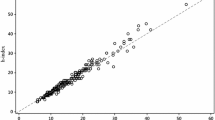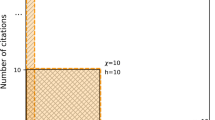Abstract
In this paper we examine the applicability of the concept of h-index to topics, where a topic has index h, if there are h publications that received at least h citations and the rest of the publications on the topic received at most h citations. We discuss methodological issues related to the computation of h-index of topics (denoted h-b index by BANKS [2006]). Data collection for computing the h-b index is much more complex than computing the index for authors, research groups and/or journals, and has several limitations. We demonstrate the methods on a number of informetric topics, among them the h-index.
Similar content being viewed by others
References
Ball, P. (2005), Index aims for fair rankings of scientists. Nature News, 436: 900.
Banks, M. G. (2006), An extension of the Hirsch index: Indexing scientific topics and compounds. Scientometrics, 69(1): 161–168.
Bar-Ilan, J. (2006), H-index for Price medalists revisited. ISSI Newsletter, 2 (1): 3–5.
Bar-Ilan, J. (2008), Which h-index? — A comparison of Web of Science, Scopus and Google Scholar. Scientometrics, 74(2): 257–271.
Bar-Ilan, J., Lin, A. (2006), Which h-index? — A comparison of WoS, Scopus and Google Scholar. In: Book of Abstracts, 9th International Science & Technology Indicators Conference, Leuven, Belgium, 6–8.
Batista, P. D., Campiteli, M. G., Kinouchi, O., Martinez, A. S. (2006), Is it possible to compare researchers with different scientific interests? Scientometrics, 68 (1): 179–189.
Bornmann, L., Daniel, H. (2005), Does the h-index for ranking of scientists really work? Scientometrics, 65: 391–392.
Braun, T., Glänzel, W., Schubert, A. (2005), A Hirsch-type index for journals. The Scientist, 19(22): 8.
Braun, T., Glänzel, W., Schubert, A. (2006), A Hirsch-type index for journals. Scientometrics, 69(1): 169–173.
Burrell, Q. L. (2006), Hirsch’s h-index: a preliminary stochastic model. In: Book of Abstracts, 9th International Science & Technology Indicators Conference, Leuven, Belgium, 26–28.
Butler, L., Mcallister, I. (2006) The Hirsch index: Is it applicable to the Social Sciences? In: Book of Abstracts, 9th International Science & Technology Indicators Conference, Leuven, Belgium, 31-32.
Costas, R., Bordons, M. (2006), H-index: Advantages, limitations and its relation with other bibliometric indicators at the micro level. In: Book of Abstracts, 9th International Science & Technology Indicators Conference, Leuven, Belgium, 189–191.
Cronin, B., Meho, L. (2006), Using the h-index to rank influential information scientists. Journal of the American Society for Information Science and Technology, 57(9): 1275–1278.
Dume, B. (2006), Hottest topics in physics revealed. PhysicsWeb. Retrieved November 4, 2006, from: http://physicsweb.org/articles/news/10/5/4
Egghe, L. (2006), Theory and practise of the g-index. Scientometrics, 69(1): 131–152.
Egghe, L. (2007), Dynamic h-index: the Hirsch index in function of time. Journal of the American Society for Information Science and Technology, 58(3): 452–454.
Egghe, L., Rousseau, R. (2006), An informetric model for the Hirsch-index. Scientometrics, 69(1): 121–129.
Giles, J. (2006), Top five in physics. Nature News, 441: 265
Glänzel, W. (2006), On the h-index — A mathematical approach to a new measure of publication activity and citation impact. Scientometrics, 67(2): 315–321.
Glänzel W., Persson, O. (2005), H-index for Price medalists. ISSI Newsletter, 1(4): 15–18.
h-Index. (2006), In: Wikipedia, The Free Encyclopedia. Retrieved 16:32, November 20, 2006, from http://en.wikipedia.org/w/index.php?title=H-index&oldid=88067648
Hirsch, J. E. (2005)A, An Index to Quantify an Individuals’s Scientific Research Output. Retrieved November 4, 2006, from: http://arxiv.org/abs/physics/0508025
Hirsch, J. E. (2005)B, An index to quantify an individuals’s scientific research output. PNAS, 102(46): 16569–16572.
Iglesias, J. E., Pecharroman, C. (2006), Scaling the H-index for Different Scientific ISI Fields. Preprint. Retrieved November 4, 2006, from http://arxiv.org/ftp/physics/papers/0607/0607224.pdf
Ingwersen, P. (1998), The calculation of Web impact factors. Journal of Documentation, 54(2): 236–243.
Jacso, P. (2005), As we may search — Comparison of major features of Web of Science, Scopus and Google Scholar citation-based and citation-enhanced databases. Current Science, 89(9): 1537–1547.
Jacso, P. (2006), Deflated, inflated and phantom citation counts. Online Information Review, 30(3): 297–309.
Kelly, C. D., Jennions, M. D. (2006), The h-index and career assessment by numbers. TRENDS in Ecology and Evolution, 21(4): 167–170.
Liang, L. (2006), H-index sequence and h-index matrix: Constructions and applications. Scientometrics, 69(1): 163–169.
Meho, L. I., Yang, K. (2007), Impact of data sources on citation counts and rankings of LIS faculty: Web of science versus scopus and google scholar. Journal of the Amercian Societu for Information Science and Technology, 58(13): 2105–2125.
Miller, C. W. (2006), Superiority of the h-index over the Impact Factor for Physics. Preprint. Retrieved November 4, 2006, from http://arxiv.org/PS_cache/physics/pdf/0608/0608183.pdf
Moed, H. F. (2005), Hirsch Index is a creative and appealing construct but be cautious when using it to evaluate individual scholars. Retrieved November 4, 2006, from: http://www.cwts.nl/hm/Comments_on_Hirsch_Index_2005_12_16.pdf
Nature Newsblog (2006), Top Five in Physics. Retrieved November 4, 2006, from: http://blogs.nature.com/news/blog/2006/05/top_five_in_physics.html
Palsberg, J. (NO DATE), The H-index for Computer Science. Retrieved November 4, 2006, from: http://www.cs.ucla.edu/~palsberg/h-number.html
Peterson, I. (2005), Rating researchers. Science News Online, 168(23), Retrieved November 4, 2006, from: http://www.sciencenews.org/articles/20051203/mathtrek.asp
Purvis, A. (2006), The h-index: Playing the numbers game. TRENDS in Ecology and Evolution, 21(8): 422.
Roediger, H. L. (2006), The h index in science: A new measure of scholarly contribution. The Academic Observer, 19(4), Retrieved November 4, 2006, from: http://www.psychologicalscience.org/observer/getArticle.cfm?id=1971
Rousseau, R. (2006)A, A Case Study: Evolution of JASISs’ Hirsch Index. Preprint, Retrieved November 4, 2006, from: http://eprints.rclis.org/archive/00005430/01/Evolution_of_h_JASIS_rev.pdf
Rousseau, R. (2006)B, Simple Models and the Corresponding H-and G-index. Preprint. Retrieved November 4, 2006, from http://eprints.rclis.org/archive/00006153/01/Rousseau_Dalian.pdf
Saad, G. (2006), Exploring the h-index at the author and journal levels using bibliometric data of productive consumer scholars and business-related journals respectively. Scientometrics, 69(1): 117–120.
Schubert, A., Glänzel, W. (2006), A systematic analysis of Hirsch-type indices for journals, preliminary results. In: Book of Abstracts, 9th International Science & Technology Indicators Conference, Leuven, Belgium, 251–253.
Sidiropoulos, A., Katsaros, D., Manolopoulos, Y. (2006), Generalized h-index for disclosing latent facts in citation networks. In: Proceedings of LinkKDD06. Retrieved November 4, 2006, from http://arxiv.org/PS_cache/cs/pdf/0607/0607066.pdf
Van Raan, A. F. J. (2006), Comparison of the Hirsch-index with standard bibliometric indicators and with peer judgment for 147 chemistry research groups. Scientometrics, 67(3): 491–502.
Author information
Authors and Affiliations
Rights and permissions
About this article
Cite this article
Bar-Ilan, J. The h-index of h-index and of other informetric topics. Scientometrics 75, 591–605 (2008). https://doi.org/10.1007/s11192-007-1880-z
Received:
Published:
Issue Date:
DOI: https://doi.org/10.1007/s11192-007-1880-z




